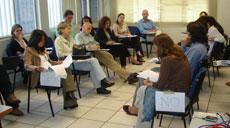Abandon Babel, Welcome Society: The Philosophy Behind Semantic Web Approaches
Published 16 years ago by Yihong Ding
 We want everybody to communicate freely by crossing the barriers of language differences and cultural variety. This is the commonly agreed upon ultimate goal of the Semantic Web. How we are to realize the Semantic Web in particular is, however, another story. Typically, there are two thoughts on how to achieve this common goal. One thought is to build a web of data; the other is to build a web of agents. Nevertheless, these two thoughts approach the same goal and represent two different philosophies. This philosophical difference may eventually determine the fate of these two approaches.
We want everybody to communicate freely by crossing the barriers of language differences and cultural variety. This is the commonly agreed upon ultimate goal of the Semantic Web. How we are to realize the Semantic Web in particular is, however, another story. Typically, there are two thoughts on how to achieve this common goal. One thought is to build a web of data; the other is to build a web of agents. Nevertheless, these two thoughts approach the same goal and represent two different philosophies. This philosophical difference may eventually determine the fate of these two approaches.
Same Target, Different Thoughts
A Web of Data
"A web of data" is a well conducted explanation of the Semantic Web. From the beginning, Tim Berners-Lee and the W3C expected the Web to become a place that allows humans and machines "to start off in one database, and then move through an unending set of databases which are connected not by wires but by being about the same thing." In the Semantic Web, data is annotated with unambiguous definitions and connected by meaningful links. The entire Web thus becomes a network of machine-processable data (including links, which are also data in another form). The Semantic Web is a web of data.
But this explanation of the Semantic Web causes problems when people start to build the Semantic Web based on this view. Typically, two questions are raised:
- Who will hold the authority on the ultimate explanation of Web data?
- Why should ordinary Web users contribute to a web of data?
It is not easy to answer either of these questions underneath the slogan of "a web of data." Nobody is willing to unconditionally obey others' explanations. Moreover, ordinary Web users do not have the motivation to add machine-processable explanations if these explanations are primarily for the benefits of others. This is the selfish nature of human beings, and we'd better not assume that the majority of Web users are humble and unselfish on the Web.
An implicit philosophy underneath this claim of a web of data is to build a new Tower of Babel, i.e., sweep over all the varieties and enforce large-scale agreements on facts. When developers build the Semantic Web with this philosophy, they show the attitudes of being proud to be more knowledgeable, being exclusive to varied interpretations, and being skeptic to public-produced knowledge explanations.
A Web of Agents
The expression "a web of agents" is less known than "a web of data." Since Semantic Web data is machine processable, machine agents can crawl over the Web themselves by knowing the meanings of data. Therefore, the Semantic Web (once realized) must simultaneously be a web of agents.
"A web of agents" views the same Semantic Web from a different angle. Specifically, this description helps answer many difficult questions about "a web of data." For example, let us revise the previous two questions underneath this view:
- Who will hold the authority on the ultimate explanation of agents?
- Why should ordinary Web users contribute to a web of agents?
This time we can directly have confident and satisfactory answers. Individual users themselves will hold the authority on the ultimate explanation of their own agents. When ordinary Web users contribute to a web of agents, users themselves immediately get the benefits by setting up communication between their own agents and other agents on the Web.
A latent philosophy underneath this claim of a web of agents is to build a new virtual society, i.e., make compromises among varieties and tolerate disagreements. When developers build the Semantic Web with this philosophy, they show the attitudes of being humble to be less knowledgeable, being tolerant to varied interpretations, and being faithful to public-produced knowledge explanations.
Discussion
What are the differences? Are both of them the Semantic Web? Yes, they are. In fact, a global-scale web of data could hardly become true without the concurrence of a web of agents. On the other hand, a web of agents is automatically a web of data because agents rely on data to process. The real issue is, however, which side we need to emphasize when starting to build a practical semantic web.
The intrinsic difference between "a web of data" and "a web of agents" is where we locate humans, i.e. human Web users, in the picture of the Semantic Web. The World Wide Web is a great success and it continues to be so only because it helps human beings. Unfortunately, however, even top-tier scientists and engineers often forget this most fundamental reason for Web evolution. Don't mistake my arguments, there is nothing wrong with the explanation "a web of data," but this explanation misleads developers from this fundamental issue of human-Web relations.
Where is the place for humans in "a web of data?" We are confused. Humans simply disappear in this explanation. We need to think extremely hard to figure out the place for humans in "a web of data." This is why it is hard to construct the Semantic Web guided by this explanation. Even developers are confused as to where to put themselves in this picture.
In contrast, the explanation "a web of agents" directly explains the human-Web relation in the future Semantic Web. Agents work on the Web; but agents are hired by humans. This is the connection! Ordinary human users can use agents to explore the wealth of machine-processable data. This cognition is not only the foundation but also the driving force of the realization of the Semantic Web.
 The Semantic Web must not be a new Tower of Babel but a new society. "Come, let us build ourselves a city, with a tower that reaches to the heavens, so that we may make a name for ourselves and not be scattered over the face of the whole earth" (NIV Bible Genesis 11:3). The Tower of Babel is place of worshipping but not a place of participating. Similarly, a web of data is to produce a platform of standards (for people to worship) but not a place of negotiation (allow people to participate). If the Semantic Web is a type of standard, there is little room reserved for ordinary users. Only a few academic elites and industrial big-boys will decide these standards for everyone. But if the Semantic Web is a type of negotiation, everybody has the right to a voice and their voices are heard and respected by others. The knowledge-description agreements are with respect to everybody. They can only be achieved with negotiations, not standards. A web of agents is to produce a platform of negotiations. It's goal is to build a society.
The Semantic Web must not be a new Tower of Babel but a new society. "Come, let us build ourselves a city, with a tower that reaches to the heavens, so that we may make a name for ourselves and not be scattered over the face of the whole earth" (NIV Bible Genesis 11:3). The Tower of Babel is place of worshipping but not a place of participating. Similarly, a web of data is to produce a platform of standards (for people to worship) but not a place of negotiation (allow people to participate). If the Semantic Web is a type of standard, there is little room reserved for ordinary users. Only a few academic elites and industrial big-boys will decide these standards for everyone. But if the Semantic Web is a type of negotiation, everybody has the right to a voice and their voices are heard and respected by others. The knowledge-description agreements are with respect to everybody. They can only be achieved with negotiations, not standards. A web of agents is to produce a platform of negotiations. It's goal is to build a society.
The Web is not for data; the Web is for humans. A project, no matter how great its design is, will not be executed on the public Web unless its only focus and all of its focuses are directly about humans. We will have a web of data in the end because the Semantic Web is a web of data. Academically there is nothing wrong with this explanation, but this explanation must not be the guide for realizing the Semantic Web.
Summary
From Babel to society, we have a visionary transformation of understanding the Semantic Web. The Babel-version of the Semantic Web shows the proud, exclusive, and skeptic side of human emotions. The society-version of the Semantic Web shows the humble, tolerating, and faithful side of human emotions. Although both "a web of data" and "a web of agents" present the same Semantic Web, this emotional difference inside developers' subconscious mind may eventually decide the ultimate fate of the Semantic Web.
About the author
Trackback URL for this entry:
http://www.semanticfocus.com/blog/tr/id/545498/
Spam protection by Akismet
Post a comment


Recently Commented Blog Entries